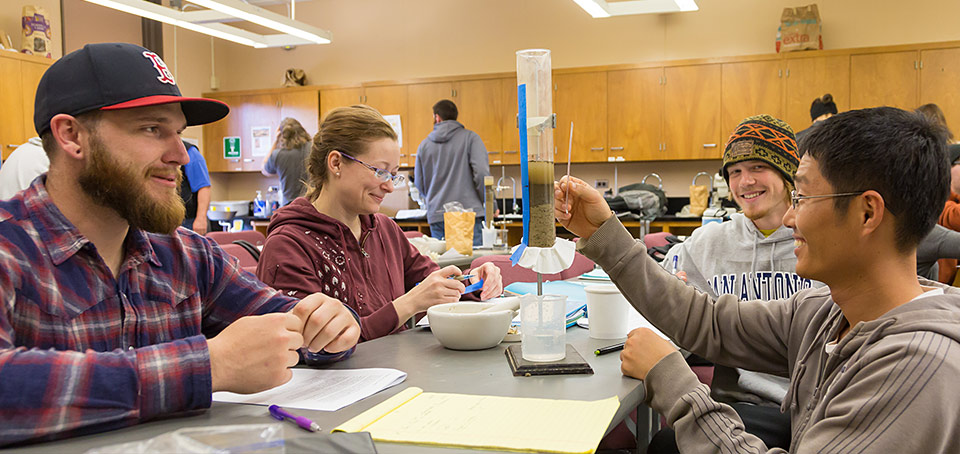
Contact Information

- Division
- Sciences and Mathematics
- Dean
- Megan D'Errico
- Associate Dean
- Keely Carroll

- Division Office
- V 211, Rocklin Campus
Overview
Sustainable agriculture is an integrated system of plant and animal production practices having a site-specific application that will, over the long-term, satisfy human food and fiber needs; enhance environmental quality and the natural resource base upon which the agriculture economy depends; make the most efficient use of nonrenewable resources and on-farm resources and integrate, where appropriate, natural biological cycles and controls; sustain the economic viability of farm operations and enhance the quality of life for farmers and society as a whole.
TRANSFER AND MAJOR REQUIREMENTS in Agriculture are available in the Counseling Center. In all cases, students should consult with a counselor for specific transfer requirements.
Faculty
Michelle S. Macfarlane
Professor, Agriculture
B.S., California State University, Chico
M.S., University of California, Davis
Shannon Spears
Professor, Agriculture
B.S., Cal Poly State University, San Luis Obispo
M.S., Cal Poly State Uiniversity, San Luis Obispo
Agriculture Advisory Committee
- Agricultural Commissioner, Placer County, CA
- Bruin Ranch, Sacramento, CA
- D & D Farms, Sacramento and Yuba City, CA
- Del Oro High School, Loomis, CA
- Deputy Sector Navigator, Ag., Water and Environmental Technology
- Flying Mule Farms, Auburn, CA
- Foresthill High School, Foresthill, CA
- Fowler Nursery, Newcastle, CA
- Highland Orchard, Penryn, CA
- Lincoln High School, Lincoln, CA
- Nevada Union High School, Grass Valley, CA
- Placer County Planning Commission, Placer County, CA
- Placer Grown, Auburn, CA
- Placer High School, Auburn, CA
- Sierra Foothill Research & Extension Center, Browns Valley, CA
- Snow's Citrus, Newcastle, CA
- UCCE Livestock & Natural Resources Advisor
Degrees/Certificates
Associate Degree
Certificate of Achievement
Skills Certificate
Sustainable Agriculture
AS Degree
(formerly Agriculture)
The Sustainable Agriculture major combines the skills and knowledge to incorporate economic viability, environmental stewardship and social responsibility in food and farming systems. This broad-based degree combines plant and soil science, animal science and business in a hands-on approach to prepare students for the workforce or for transfer to a four-year institution. In all cases, students should consult with a counselor for more information on university admission and transfer requirements. For the degree, students must fulfill the following major requirements with grades of “C” or better, complete a minimum of 60 degree-applicable semester units (12 of which must be completed at Sierra College) with a grade point average of at least 2.0 and complete one of the following three general education patterns:
- Sierra College Associate Degree Requirements;
- California State University General Education Breadth (CSU GE) pattern;
- or Intersegmental General Education Transfer Curriculum (IGETC).
Required Courses
| Code | Title | Units |
|---|---|---|
| AGRI 0156 | Introduction to Plant Science (also BIOL 21) | 4 |
| AGRI 0196 | Introduction to Sustainable Agriculture | 3 |
| AGRI 0200 | Introduction to Animal Science | 4 |
| AGRI 0215 | Introduction to Agricultural Business and Economics | 3 |
| AGRI 0221 | Introduction to Soil Science | 3 |
| Select 6-8 units from the following: | 6-8 | |
| Internship in Agriculture (up to 4 units) | ||
| Integrated Pest Management | ||
| Methods of Propagation | ||
| Sustainable Tree Care | ||
| Food, Society and the Environment | ||
| Animal Feeds and Nutrition | ||
| Direct Farm Marketing | ||
| Agriculture Mechanics | ||
| Total Units | 23-25 | |
Sustainable Agriculture
Certificate of Achievement
(formerly Agriculture)
The Sustainable Agriculture major combines the skills and knowledge to incorporate economic viability, environmental stewardship and social responsibility in food and farming systems. This broad-based certificate combines plant and soil science, animal science and business in a hands-on approach to prepare students for the workforce or for transfer to a four-year institution. In all cases, students should consult with a counselor for more information on university admission and transfer requirements. A certificate is designed to provide career technical skills; it is not equivalent to an associate degree.
Required Courses
| Code | Title | Units |
|---|---|---|
| AGRI 0156 | Introduction to Plant Science (also BIOL 21) | 4 |
| AGRI 0196 | Introduction to Sustainable Agriculture | 3 |
| AGRI 0200 | Introduction to Animal Science | 4 |
| AGRI 0215 | Introduction to Agricultural Business and Economics | 3 |
| AGRI 0221 | Introduction to Soil Science | 3 |
| Select 6-8 units from the following: | 6-8 | |
| Internship in Agriculture (up to 4 units) | ||
| Integrated Pest Management | ||
| Methods of Propagation | ||
| Sustainable Tree Care | ||
| Food, Society and the Environment | ||
| Animal Feeds and Nutrition | ||
| Direct Farm Marketing | ||
| Agriculture Mechanics | ||
| Total Units | 23-25 | |
Sustainable Agriculture Business
Skills Certificate
Designed to give students the small sustainable farm business management knowledge and abilities to successfully enter the workforce as a small farm owner or manager. This skills certificate focuses on skills and knowledge relative to the principles of agribusiness management, sustainable agriculture and direct farm marketing. This is a specialty certificate designed to provide career technical skills; it is not equivalent to an associate degree.
Required Courses
| Code | Title | Units |
|---|---|---|
| AGRI 0196 | Introduction to Sustainable Agriculture | 3 |
| AGRI 0212 | Direct Farm Marketing | 2 |
| AGRI 0215 | Introduction to Agricultural Business and Economics | 3 |
| BUS 0242 | Entrepreneurship - Small Business Management | 3 |
| Total Units | 11 | |
Urban and Wildland Forestry
Skills Certificate
Designed to prepare students for employment as utility foresters who assess trees and other vegetation in utility right-of-ways to prevent interference with high voltage lines and other utility equipment. Utility Foresters work independently in urban and wildland areas, and interface with land owners to explain required vegetation management. A skills certificate is designed to provide technical skills; it is not equivalent to an associate degree.
Required Courses
| Code | Title | Units |
|---|---|---|
| AGRI 0164 | Sustainable Tree Care | 3 |
| BIOL 0024 | Wildland Trees and Shrubs (Dendrology) (Also AGRI 0163) | 4 |
| COMM 0008 | Interpersonal Communication | 3 |
| Total Units | 10 | |
Courses
Understanding course descriptions
AGRI 0028. Independent Study
Units: 1-3
Designed for students interested in furthering their knowledge at an independent study level in an area where no specific curriculum offering is currently available. Independent study might include, but is not limited to, research papers, special subject area projects, and research projects. See Independent Study page in catalog. (CSU, UC-with unit limitation)
AGRI 0095. Internship in Agriculture
Units: 0.5-4
Designed for advanced students to work in an area related to their educational or occupational goal. Provides new on-the-job technical training under the direction of a worksite supervisor, allowing students to expand knowledge and skills in the chosen field. Mandatory orientation session and faculty approval to determine eligibility. Students may earn up to a total of 16 units in internship courses (any course numbered 95 and PDEV 94). (CSU-with unit limitation)
AGRI 0156. Introduction to Plant Science
Units: 4
Formerly known as HORT 2
Also known as BIOL 21
Advisory: Eligibility for ENGL 1A
Hours: 108 (54 lecture, 54 laboratory)
Emphasizes structure, growth, physiology and reproduction of flowering plants and their responses to modifications and environment; including propagation, media, soil and plant nutrition. Explores the interrelationship of plant science with other life sciences and technology. Applies principles of plant science to agricultural systems. (CSU, UC)
AGRI 0159. Integrated Pest Management
Units: 3
Formerly known as HORT 52
Hours: 54 lecture
Comprehensive study of integrated pest management with emphasis on sustainable management practices of landscape and small crop pests. Includes identification and study of insects, weeds, plant diseases, vertebrate pests, and beneficial organisms. Studies least toxic pest control strategies, labeling, formulations and safe handling of pesticides. (CSU)
AGRI 0160B. Methods of Propagation
Unit: 1
Formerly known as HORT 134B
Hours: 54 laboratory
Provides an advanced level of skill, technique and experience in spring plant production. In-depth studies of propagation materials, sexual and asexual reproduction, transplanting and planting. Preparation and use of propagation and planting media. (not transferable)
AGRI 0163. Wildland Trees and Shrubs (Dendrology)
Units: 4
Also known as BIOL 24
Formerly known as NATR 25
Advisory: Eligibility for ENGL 1A
Hours: 108 (54 lecture, 54 laboratory)
A study of botanical characteristics, taxonomy, and physiology of the major trees and shrubs in the Western United States with emphasis on California. Discussion of plant community relationships, geographical ranges, and human impact on forest ecosystems. Identifying specimens under field conditions and using herbarium specimens. (CSU)
AGRI 0164. Sustainable Tree Care
Units: 3
Formerly known as HORT 40
Hours: 90 (36 lecture, 54 laboratory)
Sustainable arboriculture principles and practices for management and care of trees in urban, agricultural, and wildland-urban interface settings. Includes tree biology and culture; landscape tree identification; industry-approved tree maintenance, planting, staking, and pruning techniques; tree risk assessment and mitigation; appropriate selection and pruning of fruit trees. Basic concepts in forest management and current issues in urban and wildland forestry will also be covered. (CSU)
AGRI 0196. Introduction to Sustainable Agriculture
Units: 3
Hours: 54 lecture
Introduction to the concepts and principles of agroecology as applied to the design and management of sustainable agricultural systems. Includes examination of case studies connecting sustainable agriculture principles to farming practices. (CSU, UC)
AGRI 0198. Food, Society and the Environment
Units: 3
Advisory: Eligibility for ENGL 1A
Hours: 54 lecture
Multiple perspectives and global connections between the environment, society and food production. Emphasis on agriculture's central position between nature and society and its key role in humanity's search for a productive and sustainable environment. (CSU, UC)
AGRI 0200. Introduction to Animal Science
Units: 4
Advisory: Eligibility for ENGL 1A
Hours: 108 (54 lecture, 54 laboratory)
A scientific approach to the field of animal science and the interrelationships of domestic animals and their contribution to the modern agriculture industry. Introduces various disciplines, including cell function, genetics, anatomy and physiology, reproduction, nutrition, animal health, animal products and animal behavior. (C-ID AG-AS 104) (CSU, UC)
AGRI 0203. Animal Feeds and Nutrition
Units: 4
Formerly known as AGRI 12
Advisory: Eligibility for ENGL 1A
Hours: 108 (54 lecture, 54 laboratory)
An introduction to the feeds and nutrition of animals including basic digestive system anatomy and physiology; composition and selection of feeds; characteristics of nutrients; principles of nutrition; nutrient requirements of non-ruminant and ruminant animals; and formulating diets to meet these requirements. (CSU)
AGRI 0212. Direct Farm Marketing
Units: 2
Hours: 36 lecture
Overview of direct farm marketing. Includes innovative marketing alternatives for the small to medium size grower, proven methods of product development, promotion, pricing and distribution. (not transferable)
AGRI 0213. Agriculture Mechanics
Units: 3
Hours: 90 (36 lecture, 54 laboratory)
Shop skills essential to mechanized agriculture, including welding, metal and wood fabrication tools, electrical and plumbing. Proper selection, use, repair, and safety of the tools and equipment will be emphasized. (CSU)
AGRI 0215. Introduction to Agricultural Business and Economics
Units: 3
Advisory: Eligibility for ENGL 1A
Hours: 54 lecture
Provides an overview of the role agriculture business and economics play in United States and world economies and how these aspects impact the agricultural producer in day to day management, the consumer and the food system. Production and supply, marketing and demand, resource allocation and commodity pricing will be discussed as well as social and economic challenges of agriculture in urban and industrialized economies emphasizing California. (CSU, UC)
AGRI 0221. Introduction to Soil Science
Units: 3
Advisory: Eligibility for ENGL 1A
Hours: 90 (36 lecture, 54 laboratory)
Soils as natural bodies formed by interactive environmental processes, classification and characteristics. Soil response to use and management including erosion, moisture retention, structure, cultivation, organic matter and microbiology. Laboratory topics include soil type, classification, soil reaction, soil fertility and physical properties of soil. (C-ID AG-PS 128 L) (CSU, UC)
Program Student Learning Outcomes (PSLOs)
- Assess the interdependence of relationships that exist between plants, animals, the environment and humans.
- Evaluate the economic importance of agriculture to various societies/cultures.
- Assess the impacts of agricultural production practices on the environment and society.
- Relate the biology of plants and or animals to agricultural management practices.



